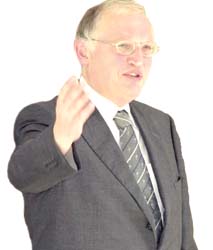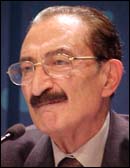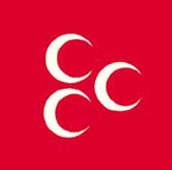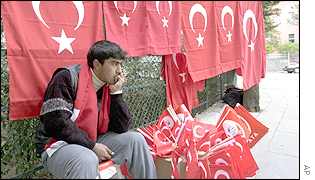2
July 2002
![]()
2. "Ailing Turkish PM says no early elections, pledges progress on EU reforms", Turkey's ailing Prime Minister Bulent Ecevit declared Monday that his government would stay in power until the end of its mandate in 2004 and pledged progress on controversial EU-demanded reforms in a bid to defuse nagging fears over political and economic stability.
3. "MHP threatens withdrawal", Sokmenoglu says if the coalition partners of the nationalist party collaborate with the opposition parties in legislating through Parliament Kurdish education and broadcasting reforms, the MHp will not stay in the government.
4. "Bahceli: We won't negotiate on death penalty", following yesterday’s leaders’ summit at Prime Ministry Residence, Nationalist Action Party (MHP) leader Devlet Bahceli convened top party officials to discuss the summit.
5. "Leader: Turkey's test", Bulent Ecevit is the last of Turkey's heavyweight politicians. Until recently he was regarded as the one man who could hold together an uneasy coalition and avert a crisis in the markets. He still believes he is. But by hanging on to office when confidence in his abilities has evaporated, the ailing prime minister is doing precisely what he hopes to prevent.
6. "The Emperor's Clothes", as it so happened, I heard President Bush's speech in Copenhagen. It reminded me immediately of the most famous story created in that town: "The Emperor's Clothes". And what i s terrorism? Terrorism is what the enemies of the USA are doing. Friends of the USA cannot, of course, do such a thing. In Turkey, for example, it is the Kurds who are the terrorists, while the Turkish army is a humanitarian outfit.
1. - AFP - "EU not ready to start membership talks with Turkey: Verheugen":
BERLIN / 1 July 2002
The European Commission is not prepared to give Turkey a date for
the start of its negotiations for joining the European Union until it
has fulfilled the criteria for membership, EU Enlargement Commissioner
Guenter Verheugen said in an interview Monday.
Verheugen told the Frankfurter Allgemeine Zeitung that there would be no deal-making with Turkey, for instance by rewarding flexibility by Ankara in a dispute over Cyprus at the EU summit in Copenhagen at the end of the year, with an offer for membership in the bloc. "The Commission is opposed to horse-trading with political swaps," Verheugen said, adding that despite some progress there were still "significant" problems with Turkey's membership bid, including its maintenance of the death penalty and its position on the Kurdish minority.
A long-standing rivalry between Greece and Turkey over the island of Cyprus has been a stumbling block to a proposed accord between the EU and NATO, whose strategic support is considered key to getting the bloc's fledgling defense force up and running. Turkey, a member of NATO but not of the EU, initially opposed the accord until a compromise, negotiated by Britain and the US last year, said that EU military forces would never be used against a NATO member.
But Greece, a member of both, wants to see Turkey accept EU-proposed changes that say no NATO member which is not also an EU member - Turkey's case - could use force to resolve a conflict with an EU state. Verheugen lamented the breakdown in talks at the end of the June between the Greek and Turkish Cypriot leaders on reuniting the divided island, saying the responsibility for finding a resolution rested with Ankara.
Turkey has been an official candidate to join the EU since
December 1999 and has sought a date for the start of negotiations on
its membership. ![]()
2. - AFP - "Ailing Turkish PM says no early elections, pledges progress on EU reforms":
ANKARA / 1 July 2002 / by Hande Culpan
Turkey's ailing Prime Minister Bulent Ecevit declared Monday that
his government would stay in power until the end of its mandate in 2004
and pledged progress on controversial EU-demanded reforms in a bid to
defuse nagging fears over political and economic stability.
"We were already unanimous on the government's absolute rejection to hold early elections and the need for it to remain in office until 2004. We underlined our conviction," Ecevit, 77, told reporters after talks with his two coalition partners. Ecevit's failing health, which has kept him away from office since early May, has hit financial markets hard on fears that his absence could cause political upheaval and derail an economic recovery programme backed by a 16-billion-dollar loan from the International Monetary Fund (IMF).
In a statement issued after Monday's talks, the prime minister and his partners -- Devlet Bahceli of the Nationalist Action Party (MHP) and Mesut Yilmaz of the Motherland Party (ANAP) -- blamed the recent market turmoil on "speculation aimed at gaining political and economic advantage". "The government will implement the economic programme with determination and without concessions as it has done until now," the statement read. The government would also "accelerate work" to undertake reforms essential to make good on Ankara's candidacy since December 1999 to become an EU member, which have led to a rift in the fragile coalition and sent jitters through the volatile markets, the statement added.
Key democracy reforms, such as the abolition of the death penalty and legalizing education and broadcasts in the Kurdish language, have hit a snag due to stiff MHP resistance on the grounds that they would fan ethnic separatism and harm the country's unity. The MHP has allowed its coalition partners to seek a one-off alliance with the opposition on the abolition of the death penalty, but warned that it will quit the government if such moves become habitual. Talks between government and opposition parties to hammer out a deal on capital punishment have so far failed to produce a result and the parliament went into summer recess last week until October.
The failure to realize the reforms threatens to delay Turkey's self-imposed target of getting a date for the start of accession talks with the 15-nation EU bloc by the end of the year. The government statement said talks on EU reforms would continue until a compromise was reached and added that lawmakers would then be summoned from their summer recess for an extraordinary session to approve them. "The government parties will not allow EU-related work to adversely affect the future of the government," it added.
The government's insistence that it would stay in office came against a backdrop of sharpening criticism in Turkey's leading newspapers against the veteran leader and increasing calls from the opposition to bring elections forward from 2004. The first reaction to Monday's talks came from Tansu Ciller, the head of the opposition True Path Party (DYP). "In their meeting, the coalition leaders have once again put aside the country's real problems and engaged in useless discussion.. What is important is for Turkey to go to elections at once," Ciller said in a statement.
While the opposition see early elections as a way out
forh the crisis-hit country, they could prove to be a destabilizing
propespect. Public surveys have shown that snap polls could oust the
ruling parties from parliament and open the door for the rise of popular
Islamist leader Recep Tayyip Erdogan, which would almost certainly annoy
the army-led secularist elite of the mainly Muslim country. ![]()
3. - Turkish Daily News - "MHP threatens withdrawal":
Sokmenoglu says if the coalition partners of the nationalist party collaborate with the opposition parties in legislating through Parliament Kurdish education and broadcasting reforms, the MHp will not stay in the government
ANKARA / 2 June 2002
A senior member of the Nationalist Movement Party (MHP) warned the
other two coalition parties Monday that if Kurdish education and broadcasting
reforms were pushed through Parliament despite MHP opposition and in
collaboration with the opposition parties, the MHP would abandon the
ruling three-way coalition government.
Stressing that his party would not accept Kurdish education and broadcasting, "If our partners establish a consensus with the opposition parties, Parliament may be called back from recess for an emergency session and the death penalty can be lifted. But, our position is clear on Kurdish education and broadcasting. Our position is that if our two coalition partners agree with the opposition on those issues, than they will not be able to see us in the government in the period ahead," Deputy Parliament Speaker Murat Sokmenoglu, one of the heavy guns of the MHP, said.
Speaking to press during a visit to him by Social Democrat People Party (SHP) leader Murat Karayalcin, Sokmenoglu said anxiety over the health situation of Prime Minister Bulent Ecevit was playing havoc in Turkish markets.
Sokmenoglu said everything was locked in the country and gossips and cyber reports were floating around about the health of the prime minister, while everyone was aware of the true nature of his illness.
He said but for the national soccer team that became the world's no. 3 at the World Cup, the Turkish nation would be living a psychological collapse.
Sokmenoglu said the downgrading by the S&P of Turkey's rating was an alarming sign and recalled that the 1994 crisis was triggered by a similar action of that rating company.
Stressing that Turkey somehow must solve the "acting prime minister" issue, Sokmenoglu recalled that when he underwent a minor operation U.S. President George Bush handed over his presidential duties for a few hours to Vice President Dick Cheney.
"If the prime minister had fallen ill while visiting northern Cyprus, in accordance with the coalition protocol, MHP leader Devlet Bahceli would automatically become the acting prime minister. We have lost many things over the past time," Sokmenoglu said.
According to the Turkish Constitution, the post of prime
minister cannot be occupied by a care taker while the prime minister
is within the borders of the country, even if he is incapacitated by
illness. ![]()
4. - Sabah - "Bahceli: We won't negotiate on death penalty":
2 July 2002
Following yesterday’s leaders’ summit at Prime Ministry
Residence, Nationalist Action Party (MHP) leader Devlet Bahceli convened
top party officials to discuss the summit.
“We are all determined to maintain the coalition government, but the other coalition partners cannot count on our support for an agreement to abolish capital punishment,” said Bahceli.
“The other partners must reach an arrangement with
the opposition, if they can.” He added that no MHP deputies would
serve on a parliamentary commission to discuss the death penalty issue
. ![]()
5. - Financial Times - "Leader: Turkey's test":
2 July 2002
Bulent Ecevit is the last of Turkey's heavyweight politicians. Until
recently he was regarded as the one man who could hold together an uneasy
coalition and avert a crisis in the markets. He still believes he is.
But by hanging on to office when confidence in his abilities has evaporated,
the ailing prime minister is doing precisely what he hopes to prevent.
Political leaders rarely find it easy to let go. Mr Ecevit is no exception, with some good reason. He steered his government through the foreign exchange crises of 2000 and 2001. And since November he has overseen a period of relative stability, with falling inflation, lower interest rates and stronger growth.
But ill-health has sapped Mr Ecevit's authority. It is sorely missed. During his long absence coalition members have been at loggerheads over reforms necessary for membership of the European Union. The government is fragile and there is no obvious successor to hold it together.
Ismail Cem, the foreign minister, would perhaps be the most popular choice to take over from Mr Ecevit at the top of the Democratic Left party. But he may be too leftwing for the Nationalists, who have almost as many seats in parliament and therefore a claim on the prime minister's office.
However, none of the government parties wants to see early elections, as Mr Ecevit made clear yesterday after his first proper coalition meeting in 40 days. A recent opinion poll put support for each of them below 10 per cent - the threshold required for representation in parliament. Public confidence in Turkey's political class is low and memories of recent economic crises are still fresh.
The instinct for self-preservation should act as a useful discipline on the coalition parties. If they want to avert electoral disaster they must start negotiations on an acceptable leader. But first the incapacitated prime minister should announce his intention to resign.
No leader is irreplaceable, as Mr Ecevit should know. In April 2000 he made a botched attempt to secure a second term for President Suleyman Demirel in the interests of stability and continuity. He succeeded in precipitating the very panic in the markets he was trying to avoid. In the end, the departure of Mr Demirel, and his populism and association with sleaze was greeted with relief, not regret.
Uncertainty is inevitable in Turkey's labyrinthine politics.
The question is how to reduce it. A new leader could provide a sense
of direction on the government's reform programme. The incapacitated
Mr Ecevit, in office but barely in power, cannot. ![]()
6. - Opinion by Uri Avnery* - "The Emperor's Clothes":
1 July 2002
As it so happened, I heard President Bush's speech in Copenhagen.
It reminded me immediately of the most famous story created in that
town: "The Emperor's Clothes".
Everybody praised this fine speech. Prime Minister A. lauded the style, President B. commended the fabric, Sheik C. admired the collar. And I saw only a naked emperor.
Everynody knew, of course, that it was a stupid speech, perhaps the most silly ever uttered by an American president. But who will confront the leader of the world's sole superpower? Who will bring upon himself the wrath of a man that ossesses such frightening power, while voicing such inanities? A 12-year old would have been ashamed of presenting such a composition to his teacher. The assumptions are baseless, the general picture resembles a caricature, the conclusions are ridiculous and the parts contradict each other.
It says that the Palestinians must chose their leader in a free, democratic election, but that they are forbidden to elect a leader not approved by Sharon and Bush. They must establish a democratic, liberal, pluralistic and multi-party system, including separation of powers, independent courts and transparent finances. For that purpose they are commanded to accept the assistance of America's allies in the Middle East: democratic Saudi Arabia, pluralistic Egypt and liberal Jordan. Financial transparency like in Riyadh, separation of powers like in Cairo, independent courts like in Amman.
The establishment of this ideal system is a precondition to any peace negotiations. In Europe, such a system was achieved after a struggle of hundreds of years. In the Arab world, it does not exist anywhere. Arafat is the only Arab chief of state who was chosen in free elections, under close international supervision, personally overseen by ex-President Jimmy Carter.
In Bush's crooked mirror, terrorism antedates the occupation. Indeed, he did not mention the occupation at all in this context. There is nothing but terrorism. In his limited world-view, terrorism is the sum of everything: In the beginning God created the War on Terrorism, and the whole world revolves around it. Terrorism, like Satan, exists since the creation, it is not the result of anything, it has its own independent existence. And, much as a devout Christian is commanded to fight Satan every moment in his life on earth, so must every human being fight terrorism and will be judged accordingly by the divine judge, Bush.
And what i s terrorism? Terrorism is what the enemies of the USA are doing. Friends of the USA cannot, of course, do such a thing. In Turkey, for example, it is the Kurds who are the terrorists, while the Turkish army is a humanitarian outfit. Good friend Putin does not commit acts of terrorism, his deeds in Grozni are nearly as charitable as those of Sharon in Jenin.
But Artafat is a terrorist. He is also corrupt, also a dictator. This needs no proof. Sharon says so, and Sharon is beyond reproach. Arafat has to be eliminated, removed from office, expulsed, murdered. (Bush, of course, does not speak of murder, but not so long ago the decree forbidding American agencies to kill foreign leaders was rescinded. Actually, in this instance their involvement is not needed, the slightest hint will suffice for Sharon to execute the deed at once.)
What will happen after Arafat's removal-expulsion-murder? According to Bush, it's quite simple: reform-minded Palestinians will come forward, take some Palestinian professor from Harvard or Oxford as president and create the Palestinian Switzerland.
Bush, of course, does not imagine that something very different is going to happen. The man after Arafat will have to show that he is no Mossad or CIA stooge, therefore he will have to be more extreme than Arafat. In order to avoid being executed as a traitor within 24 hours, he will have to create an alliance with Hamas,. In the coming elections, the candidate of the "National and Islamic Forces" will surely win.
That's the best-case scenario. In the worst-case scenario, there will not be an alternative leadership at all. Palestinian society will break up into hundreds of shreds, each of which will commit suicide bombings in the occupied territories, Israel, throughout the Middle East and the world. Chaos will reign supreme. This is what Sharon really desires, because it will enable him to carry out ethnic cleansing and annex the Palestinian territories, fulfilling his dream of at least 50 years.
The good Bush certainly does not want this, but since he has become the squire of Sharon, a kind of American Sancho Panza to the Israeli Don Quixote, it's what the Don says that counts. After the speech, I met with a senior European diplomat. "Well, it may not be the most brilliant discourse we ever heard," he said with a slight, ironic smile, "But it's what we have got. It would not be wise to confront Bush head on, that would only cause him to become obstinate."
If so, what can be done? The ironic smile did not leave his lips. "European diplomacy has hundreds of years of experience. The clever thing to do is to pick from the speech one positive sentence and blow it up, ignoring the negative parts." Europe will concentrate on the elections. These must be free, under close international supervision. For the elections to be free, candidates must be free to move. For parties to be formed and conduct their campaigns, there must be freedom of speech and association. All this is impossible under occupation. Therefore, first of all, the occupation has to be removed from the Palestinians territories.
Under the Oslo agreements, the Palestinian inhabitants of Jerusalem enjoy the right of active and passive vote, and they, too, must be allowed to move and campaign freely. Until the elections, the existing elected instituted, including the chairman of the authority, must continue to function. Europe will continue to deal with him. Arafat, of course, like any other citizen, has the right to present his candidacy - and, if chosen in a free election, the world (led by Europe) will recognize him. Nobody doubts that he will indeed be elected by a massive majority.
So, after all, a golden thread can be found in the emperor's clothes. Attention: Hans Christian Anderson.
*Uri Avnery is a free-lance journalist and an activist
of the peace organisation "Gush Shalom". He is a former member
of Knesseth and also a winner of the alternativ Peace Nobel Prize 2001.
![]()